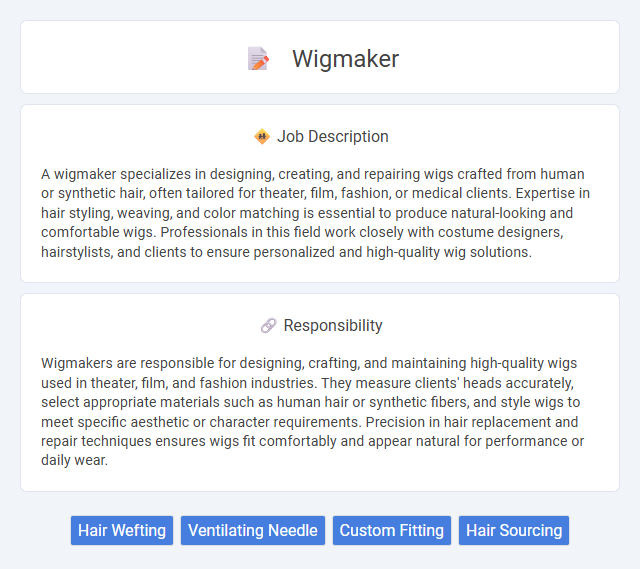
A wigmaker specializes in designing, creating, and repairing wigs crafted from human or synthetic hair, often tailored for theater, film, fashion, or medical clients. Expertise in hair styling, weaving, and color matching is essential to produce natural-looking and comfortable wigs. Professionals in this field work closely with costume designers, hairstylists, and clients to ensure personalized and high-quality wig solutions.
Individuals with a keen eye for detail and steady hand coordination are likely suitable for a wigmaker job, as the role involves intricate craftsmanship and precision. People who enjoy working with various materials and have patience for meticulous tasks may find this work fulfilling and manageable. Candidates prone to repetitive strain or those who prefer fast-paced environments might encounter challenges in adapting to the wigmaker's methodical workflow.
Qualification
A skilled wigmaker requires expertise in hair design, cutting, and styling, with proficiency in various materials such as human hair, synthetic fibers, and lace. Formal training in cosmetology or specialized wigmaking courses enhances capabilities, including color matching and custom fitting techniques. Experience with advanced tools like ventilating needles and blocking heads is essential for producing high-quality, natural-looking wigs.
Responsibility
Wigmakers are responsible for designing, crafting, and maintaining high-quality wigs used in theater, film, and fashion industries. They measure clients' heads accurately, select appropriate materials such as human hair or synthetic fibers, and style wigs to meet specific aesthetic or character requirements. Precision in hair replacement and repair techniques ensures wigs fit comfortably and appear natural for performance or daily wear.
Benefit
A wigmaker is likely to benefit from a unique blend of artistic creativity and practical craftsmanship, which can lead to high job satisfaction and personal fulfillment. The profession may offer opportunities for freelance work or employment in salons, theaters, or film industries, potentially providing flexible schedules and diverse work environments. It's probable that mastering this specialized skill can result in a steady demand for services, given the ongoing need for wigs in fashion, entertainment, and medical contexts.
Challenge
Wigmakers likely encounter challenges involving precise craftsmanship and attention to detail, as accurately replicating natural hair patterns can be complex. The probability of material shortages or variations in hair quality may add difficulty to maintaining consistent standards. Meeting clients' unique style preferences might also require adaptability and creative problem-solving skills.
Career Advancement
A wigmaker career offers a unique blend of craftsmanship and creativity, with opportunities to advance into senior artisan or design specialist roles. Mastery in specialized techniques such as hand-knotting and custom fitting enhances prospects for leadership in theatrical, film, or medical wig production sectors. Continuous skill development in materials science and digital design tools accelerates progression toward management or entrepreneurship within the wigmaking industry.
Key Terms
Hair Wefting
Hair wefting is a specialized technique used by wigmakers to create natural-looking wigs by sewing or bonding hair strands onto a fabric strip. This precise method ensures volume and length are seamlessly blended, enhancing the wig's durability and aesthetic appeal. Skilled wigmakers utilize high-quality hair wefts to customize wigs for various styles, ensuring comfort and a realistic appearance for the wearer.
Ventilating Needle
A wigmaker specializing in ventilating needles expertly hand-ties individual hair strands onto lace or mesh bases to create realistic, breathable wigs. This meticulous process enhances natural hair movement and scalp ventilation, providing comfort and durability for the wearer. Mastery of various needle sizes and techniques ensures precise knotting, critical for achieving lifelike hair density and style.
Custom Fitting
Wigmakers specialize in custom fitting to ensure each wig perfectly contours to the client's scalp, providing maximum comfort and a natural appearance. They use precise measurements and mold-making techniques to create bespoke wigs tailored to individual head shapes and hairline specifications. Advanced materials and adjustable bases enhance the fit, durability, and wearability of the custom wig.
Hair Sourcing
Wigmakers specialize in sourcing high-quality human hair or synthetic fibers to create realistic and durable wigs tailored to client needs. They evaluate hair texture, color, and origin to ensure consistency and authenticity in wig production. Reliable hair sourcing directly impacts the final product's appearance, comfort, and longevity.
 kuljobs.com
kuljobs.com